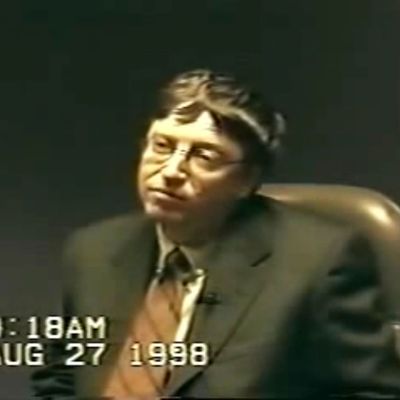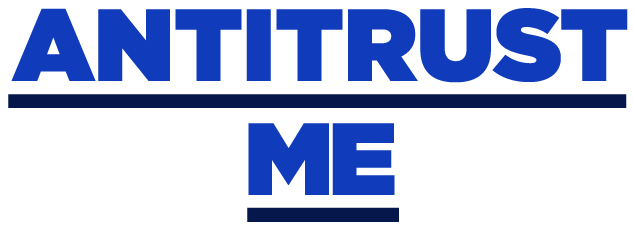
Have Silicon Valley’s biggest companies become too powerful? This series examines monopoly and power in the tech industry — and what, if anything, can be done.
On March 3, 1998, Senator Orrin Hatch called to order a hearing before the Senate Judiciary Committee. In attendance were a number of tech-industry CEOs, including Bill Gates, the co-founder of Microsoft, which single-handedly determined the course of the personal-computing industry through Windows — at that time installed on about 90 percent of computers. Two months later, the U.S. Department of Justice and 20 state Attorneys General would sue Microsoft for anti-competitive business practices and launch a court case that would last for three years.
At that moment, though, Gates was simply attempting to help answer the question Hatch had posed at the beginning of the hearing: “Is there a danger that monopoly power is or could be used to stifle innovation in the software industry today or, perhaps more importantly, looking forward?”
If Hatch’s question sounds familiar, it’s because nearly 20 years later, we’re still trying to figure out the answer. Over the last decade, Facebook and Google have emerged as the internet’s dominant powers, in many ways as a result of good business decisions: Both companies created efficient and high-quality products that beat their competitors and helped them build and cement their successes.
But the sheer size to which Facebook and Google have managed to grow presents its own set of problems. Facebook has purchased some potential competitors, like Instagram, and copied features from others, like Snapchat, leveraging its enormous user base to ensure continued dominance. Google’s bundling of services, like shopping, with its search function has drawn fines from EU antitrust regulators. And both have come under fierce criticism for the ambiguous but outsize roles they play in the dissemination of news and information, especially during last year’s election.
For all of these reasons, there’s been an upswell of interest in using the government’s antitrust power to check the expansion and influence of these tech giants. The problem, though, is that it’s not always clear what an antitrust case against Facebook or Google might look like, or what its effects might be — after all, these companies are different than Ma Bell or Standard Oil, whose monopoly statuses were obvious in effect and easy to grasp. For that reason, it’s useful to look back to the Microsoft case, and see how its legacy offers lessons in how government can effectively keep Big Tech in check, even short of actively breaking up companies.
The government’s complaint in its 1998 lawsuit contended, in essence, that the agreements Microsoft had with computer manufacturers that distributed preinstalled copies of Windows on the computers they sold were being unfairly leveraged to distribute Internet Explorer. You couldn’t get Windows without also agreeing to include IE, and some agreements put restrictions on whether and how manufacturers could offer copies of competitors’ browsers — in particular, Netscape Navigator.
“Our argument was, ‘You’ve taken steps that materially weaken these potential enablers of competition,’” recalled Douglas Melamed, who worked in the Department of Justice’s Antitrust Division at the time. “‘There’s no justification in terms of improved product quality, reduced costs, or the like for your conduct. In effect you have made it harder for new entrants to compete against you without any efficiency justification for your conduct, and that violates the antitrust law.’”
Microsoft’s defense was that Internet Explorer was baked so thoroughly into Windows that the two products were inseparable: Removing the browser functionality would cause the operating-system quality to decrease.
In a traditional antitrust case, this would likely have been a smart tactic. “Most antitrust trials are tried not like they were trials, but if they were some kind of academic investigation,” David Boies, who represented the government during the trial, explained in a 2008 talk at Harvard Law. That is, they’re judged not on persuasion but on fact-finding. Who cares how a witness comes across? All that matters is the data. (Boies, widely regarded as one of the best trial lawyers in the legal profession, is currently helping defend Harvey Weinstein.)
But as Boies put it, “Federal judges are designed to be general-purpose jurists,” not subject-matter experts. (Especially not when the subject matter is computers.) So he set about constructing testimony that called into account the credibility of witnesses.
This approach worked in large part because the trial was a rarity — an antitrust case against a popular and well-liked company. In the late ’90s, Gates’s competitors and peers may have loathed his strong-arm tactics, but nobody else did. Unlike Standard Oil or Ma Bell, the masses didn’t seem to mind or even be aware of the ill effects of Microsoft’s power. Gates was a college-dropout genius visionary who had brought computing to the masses. Even if you didn’t have a computer in your house or at work, you probably knew that Gates was the richest man in the world.
That Microsoft didn’t immediately grasp how important perception would be to this case became clear over the course of the trial, and would prove disastrous for them. There was, for instance, the hours of taped deposition featuring Bill Gates, in which the bespectacled icon came across as snarky, combative, petulant, and eager to engage in needless semantic arguments — in short, an asshole. These excerpts became a defining aspect of the case, supporting the government’s case of Microsoft as selfish and greedy.
Gates’s deposition — puzzling, aggravating, and at times comical — seems respectable in comparison to some of the technical demonstrations that Microsoft presented to the court. One videotape purportedly demonstrating that Internet Explorer was essential to the operation of Windows was rife with inconsistencies — and Boies pounced, leading Judge Jackson to say that he felt doubt had been cast “on the reliability of the entire videotape demonstration.” “That was just an inexplicable blunder on Microsoft’s part,” Melamed reminisced.
“I think going into the case, most people were on Microsoft’s side,” Harvard Law professor Lawrence Lessig said in a recent interview with Select All. In 1997, Jackson had attempted to appoint him special master concerning the 1995 consent decree, though Microsoft argued that he would not be a fair arbiter, and eventually he was dismissed from the role. “But,” he continued, “by the end of that case — both watching Bill Gates squirm and being obviously too clever by half in his testimony, and that debacle of the faked demonstration video that tried to represent how the system would be degraded if they tried to do what the government said, and it turned out it was just made up — those were moments that were reported on over and over again. And as they were reported, the public began to develop a very different sense of who the company and Bill Gates were.”
In November of 1999, Judge Jackson found in favor of the government. Microsoft did indeed hold monopoly power, and had used it to unfairly harm consumers and competitors. In June of 2000, Judge Jackson decided that Microsoft should be broken into two: A Windows OS company, and an everything-else company. But Jackson’s sudden decision wouldn’t prevail. A year later, the seven-judge panel on the D.C. Circuit Court of Appeals reversed the decision, disqualifying Jackson for misconduct. While the case was pending, he had spoken to reporters candidly about it, discarding judicial impartiality. The new Department of Justice under George W. Bush was not eager to contest the panel’s decision and stated as much on September 6, 2001. Microsoft would survive as a single company, albeit with certain stipulations in place. It was prohibited from tying Internet Explorer to Windows, and the company could no longer force OEMs to refrain from promoting competing products by way of the contracts OEMs signed to get Windows onto their PCs.
The Microsoft case offers a number of complicated lessons for the contemporary antitrust movement, not all of them encouraging. There’s a strong argument to be made, in fact, that the circumstances of Microsoft in 1998 don’t really apply to Facebook or Google. U.S. v. Microsoft focused on products sold for a fee; Facebook and Google offer products to consumers for free. These free products are a detriment consumers in considerable ways — the accumulation of vast amounts of personal data has given a select few technology companies the ability to home in on customers at the behest of anyone willing to pay, warping perception — but they don’t directly harm wallets, which has been the American test for antitrust violation since the 1970s.
“All antitrust comes down to two things: Did the defendant engage in anti-competitive conduct — meaning conduct that has no efficiency properties — and did that conduct have the effect of creating market power that the defendant wouldn’t have in the absence of that conduct?” Melamed explained. “You have to find a causal connection between market power and wrongful conduct, and I haven’t seen the case made that these companies [like Facebook and Google] have engaged in serious violations of antitrust laws.”
In other words, the first step for antitrust advocates would be to shift American legal and judicial understanding of how antitrust law works to apply it to today’s tech giants — a difficult, but not necessarily unachievable, task. Legal scholars like Columbia Law professor Tim Wu and congressional Democrats (particularly those in the newly formed Antitrust Caucus) have suggested returning antitrust to focus on all anti-competitive behavior, rather than the more narrow standard of consumer welfare. Nowhere is this distinction more clear than in tech: Google and Facebook may be free, and therefore escape scrutiny by a consumer-welfare standard — but it’d be easy to argue that their size and dominance create anti-competitive conditions for the markets in which they work.
But the structural question of the trial’s effectiveness — that is, did the lawsuit play a significant role in opening up the field for new or small tech companies like Google and Apple? — seems to have a clear answer: Yes. Boies said that the decision made every Microsoft-like company “more bureaucratic in terms of decision-making.” It began acting a lot more cautiously, and running more of its decisions past lawyers. The tech industry disruption principle to “move fast and break things” could no longer apply. Microsoft survived the case as a single company, but it emerged from the proceedings drastically changed. Interoperability between platforms and products is now key to Microsoft’s consumer business strategy. It needs its software to be available on and compatible with platforms that it doesn’t control, but does, in some ways, compete with. At the same time, the company is/was no longer confident in its ability to maintain its market share — and became so focused on protecting Windows that it was slow to adapt to the mobile-computing revolution that rival Apple came to define. Like BlackBerry, Microsoft had smartphone software before the iPhone came along, but was too confident or not nimble enough to reorient itself in time.
The most important lesson might simply be to underline that antitrust lawsuits against tech behemoths are possible. “I think one important antitrust accomplishment of the trial,” Boies reflected, “was to demonstrate that the government could indeed try a large, complicated case, and that counsel and the court could bring one of those cases to trial in a reasonable period of time.” These are gargantuan companies that can bury a government legal team in paperwork, but the challenges are not insurmountable. They just require the political willpower — and the talented lawyers — to do so.






























